Selling Personalised Products on Shopify: Benefits & Examples
The benefits of product personalisation – for both brands and customers – are abundant. By providing elevated products and meeting individual customer demands, you can increase satisfaction, inspire loyalty and boost sales. We’ve helped various brands from across a range of industries start selling personalised products on Shopify and reap the rewards, four examples of which we share below.
Written By
Hannah Smiddy
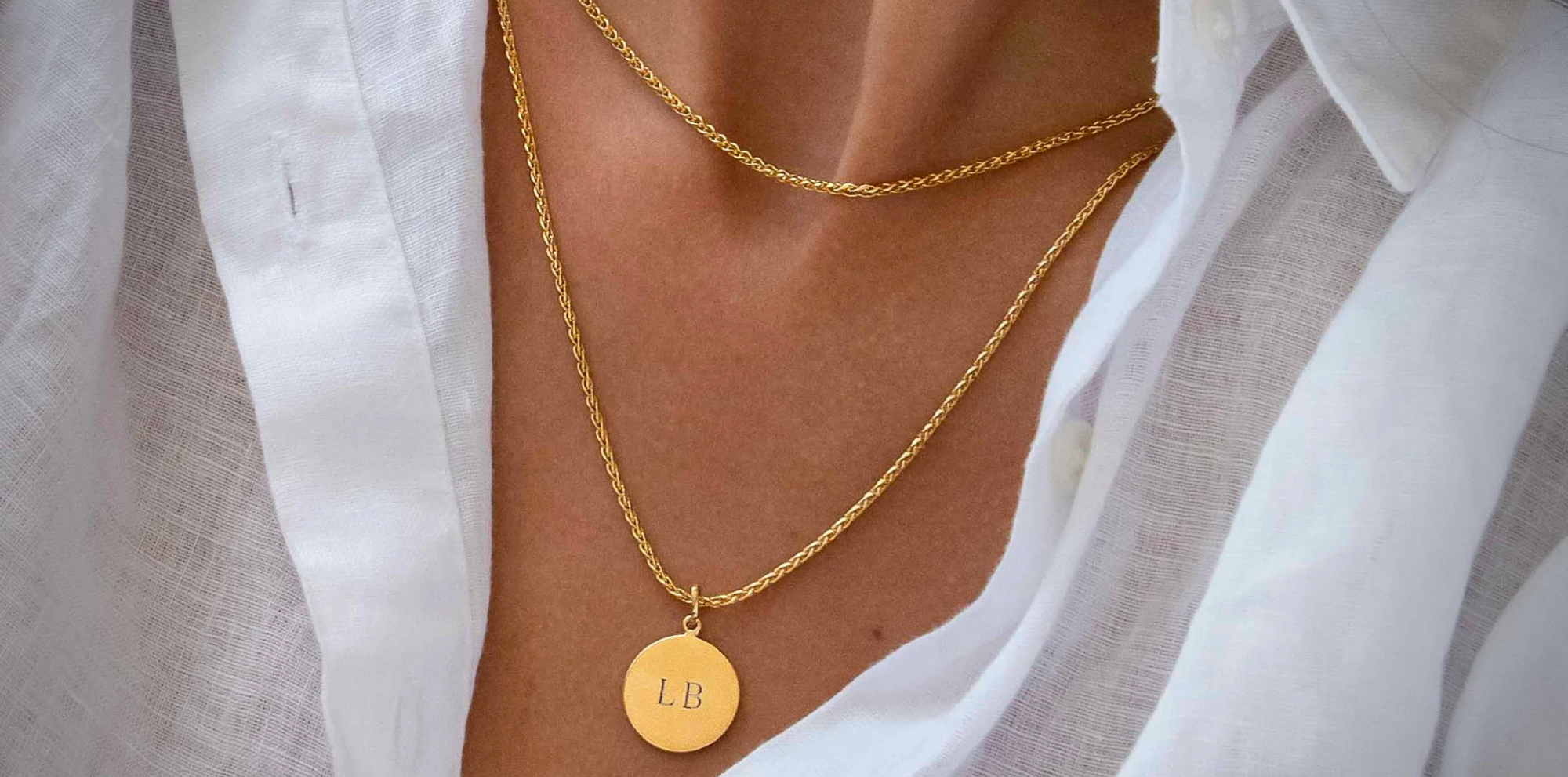
As well as a carefully tailored online shopping experience, there is an increasing appetite amongst consumers for personalised products. In fact, according to research by Deloitte, more than half of consumers are interested in purchasing customised products or services – a proportion which is only expected to grow as this trend picks up pace.1
Product personalisation can come in various forms. You might offer shoppers the chance to choose from a set of pre-designed features that can be added to their product. Or, you might want to allow customers to provide a completely original design or brief for a custom product.
When executed efficiently, selling custom products can unlock a variety of benefits for retailers and customers alike – some of which we’ll explore in this article. We’ll also share examples of functionality we have developed and implemented to enable our clients to sell personalised products on their Shopify stores.
9 benefits of product personalisation for retailers
1. Establishes stronger emotional connections with consumers
When a customer feels like a product really represents them as an individual, they’re more likely to attach emotion to it. It transcends being just another product, the result of a transaction. It becomes something much more, something with meaning.
As such, enabling shoppers to personalise products based on their specific needs and preferences helps your brand build long-term, meaningful relationships with them.
2. Builds customer loyalty
With stronger brand-customer relationships comes increased loyalty. Customers are more likely to return for future purchases – for themselves and others – if they feel connected to your brand. This is key for improving your retention and lifetime value metrics.
3. Increases brand awareness
Satisfied customers who continue to have positive experiences with your brand are more likely to share their purchases on social media and become an advocate for your products.
This word-of-mouth marketing is an effective – and free – way of helping your brand become top-of-mind amongst your target audience.
4. Differentiates you from competitors
Offering customers the chance to personalise their products can often give brands a competitive edge. This could be a particularly effective way to elevate your brand if you’re operating in a crowded market and struggling to attract, convert and retain customers.
5. Enhances sales
Together, the benefits discussed so far can combine to increase your sales. With happy customers who i) recognise the value you can provide over other brands, ii) return to purchase again, and iii) refer their friends and family, you should see checkouts – and revenue – accelerate.
6. Supports increased prices
According to Deloitte, the majority of customers are willing to pay more for a customised product (especially when buying from a fashion brand).1 This presents an opportunity for brands to charge more, knowing that shoppers will likely find the extra fee justified.
7. Reduces return rates
High product return rates continue to plague the ecommerce industry. In 2022, the average return rate hit 16.5%, with over $212 billion worth of products being returned after online purchases.2
Selling personalised products can be an effective strategy for reducing return rates. Giving customers control over certain aspects of their product and empowering them to make something unique means they’re less likely to want to return an item.
What’s more, allowing them to visualise their customised product before purchasing it – using a real-time product configurator or the like – means they’ll know exactly what to expect when their order arrives at their doorstep. Again, this should reduce the chance of disappointment.
8. Enables you to capture richer customer insights
Product personalisation offers a window into the preferences of shoppers, allowing you to finetune their customer profiles with rich zero-party data. This can then be leveraged to provide tailored omnichannel experiences in the future.
For example, you could use data captured about their colour preferences to recommend suitable complementary products in a post-purchase email flow.
9. Boosts your bottom line
As we’ve explored, offering product personalisation can help you to sell more items, at a higher price, and with fewer returns. Ultimately, if executed well and without a significant increase to your costs, product personalisation has the power to help you improve your bottom line and accelerate your digital growth.
Examples of Shopify product personalisation (implemented by Swanky)
Let’s now consider some examples of retailers who sell personalised products on Shopify and are reaping the benefits discussed above. More specifically, these are all brands who Swanky has worked with to implement customisation functionality on their ecommerce stores.
Medley: Personalised jewellery
Launched in 2020, digital pure play brand Medley has gained popularity across Australia thanks to its versatile and stylish jewellery pieces that celebrate confidence and individuality.
After recognising a strategic opportunity to tap into the increasing demand for customised jewellery, the Medley team tasked us with implementing new personalisation functionality on select product pages. Having supported this ambitious Brisbane-born brand since its inception, Swanky’s Queensland team were on-hand to provide Shopify development expertise.
We implemented, configured and styled product customisation functionality on Medley’s Shopify site, ensuring a seamless UX across mobile and desktop. This solution allows shoppers to personalise certain products with either an engraving (from a simple monogram to a meaningful word), a black and white photograph, or both.
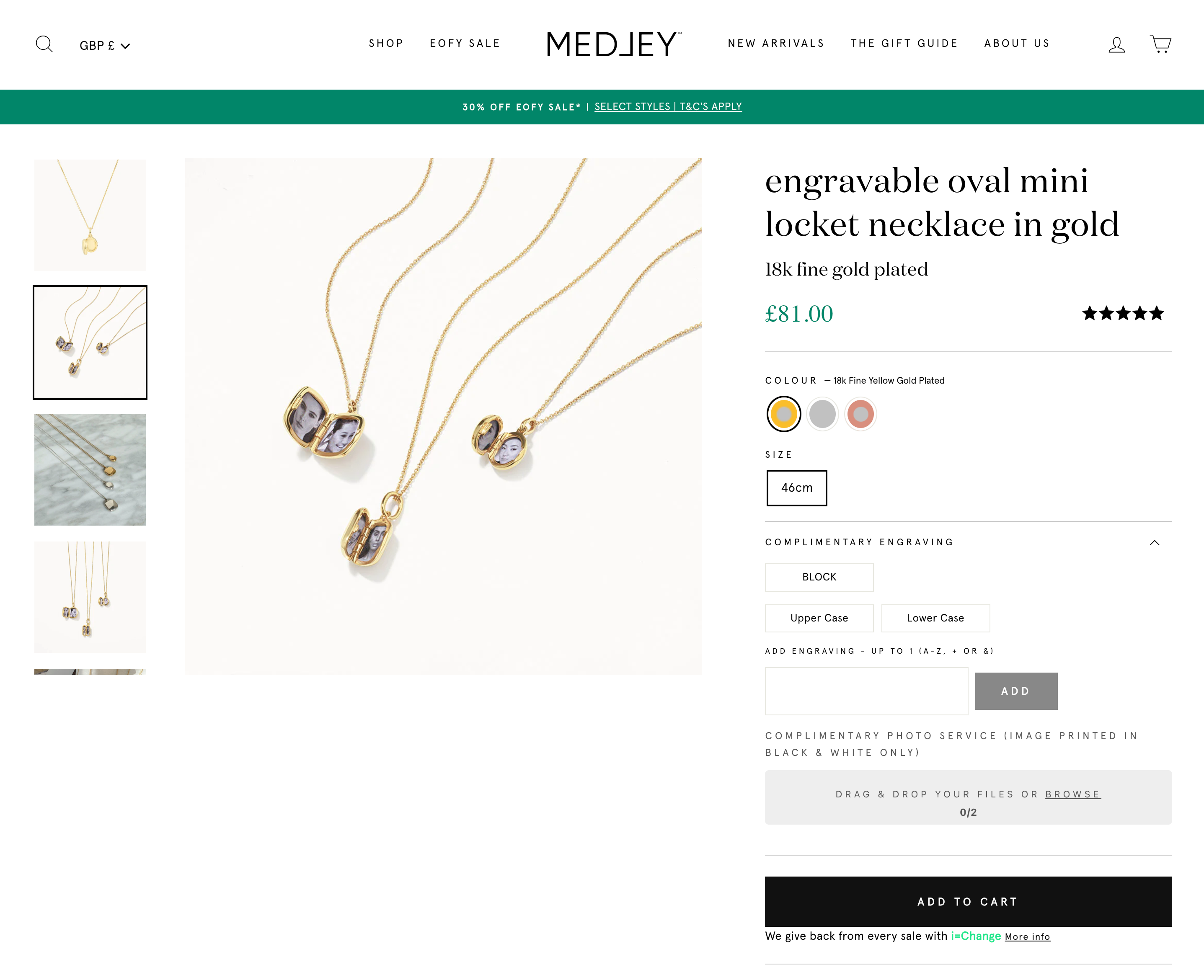
The text and image information is inputted by customers on the front-end and then passes all the way through to Medley’s inventory management system (DEAR) to simplify fulfilment.
Read more about the dazzling store we created for this jewellery brand in our case study about Medley’s new Shopify store and tech stack.
Aeris: Customised office furniture
Pioneering international retailer Aeris sells its innovative and ergonomic office furniture to customers across Europe. Shoppers can create products that are customised to suit their unique requirements, with extensive choice between colours, sizes, frames, springs, wheels and more.
We built a bespoke product configurator that leverages GraphQL to provide a fast and intuitive product customisation experience. Users can select between thousands of variants and simultaneously be presented with an instant image response based on their selection. They are also shown accurate pricing and delivery information depending on the product they currently have configured.
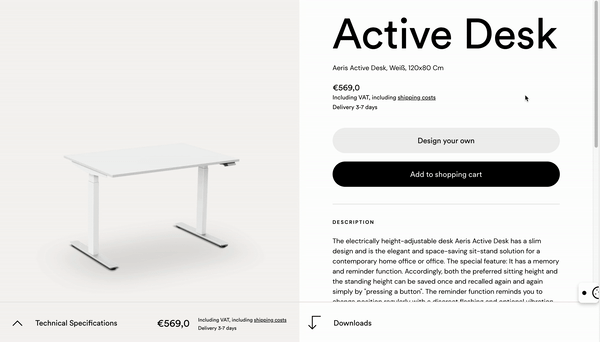
A responsive configurator like this facilitates an immersive and engaging online experience for shoppers. And, as discussed above, this sort of custom product visualisation functionality is a great way to increase a user’s confidence in their purchase and reduce the chance of a return needing to be made.
More recently, to further enhance sales of their ‘Swopper’ product, reduce return rates and increase customers’ connection with the Aeris brand, Swanky was tasked with developing and implementing bespoke product page personalisation functionality. This would allow users to get the base of their Swopper stool engraved with a name or text of their choice.
Once users have configured their Swopper to suit their needs and added it to their cart, a pop up appears offering the option to add personalisation. Should they wish to personalise their Swopper, the user can input up to 20 characters of text in the relevant pop up form field. This information is then linked to the Swopper product before being added to the user’s cart.
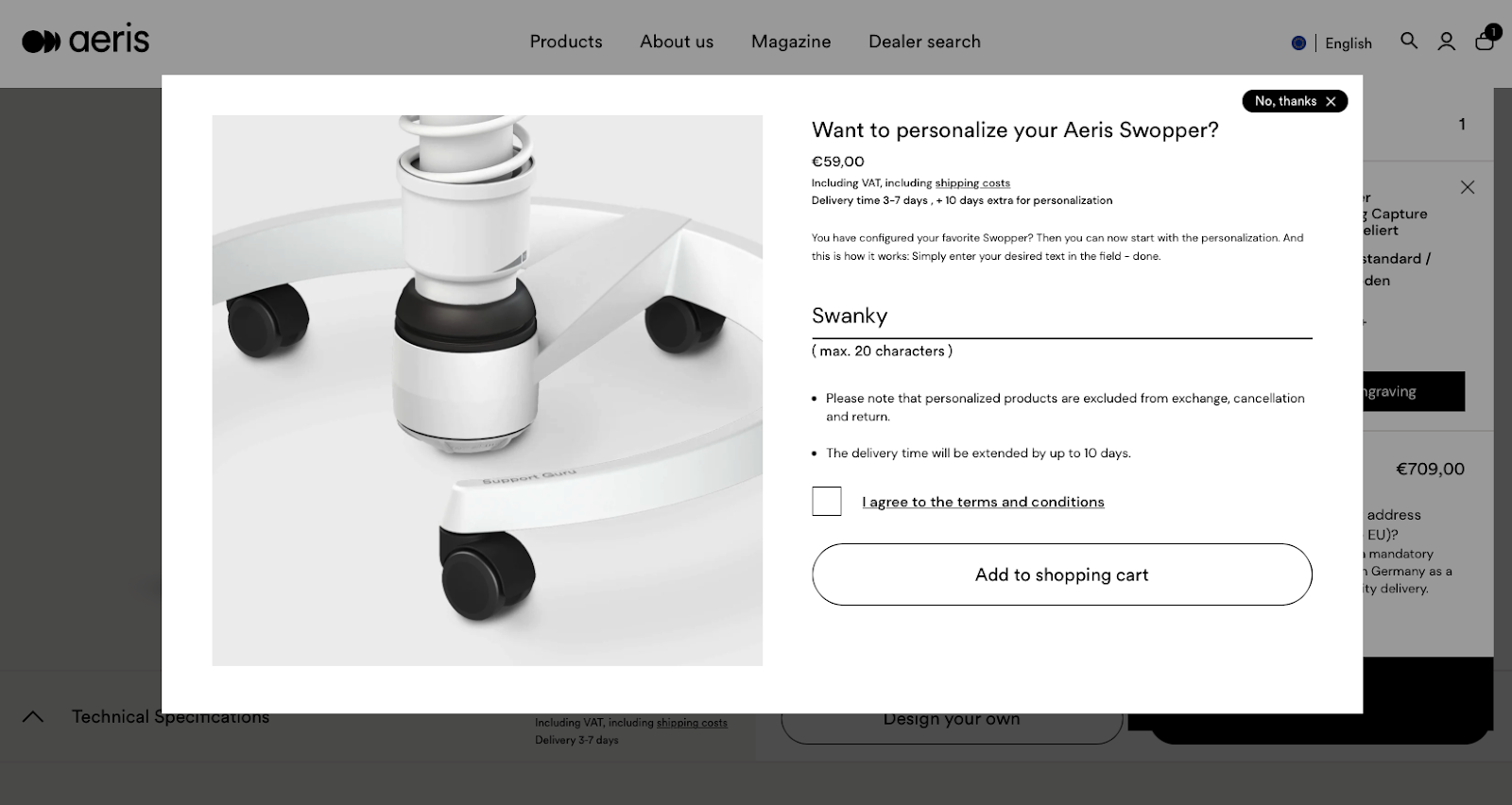
Olivia von Halle: Monogrammed nightwear
Amongst luxury nightwear brand Olivia von Halle’s decadent product collection are premium personalised pyjamas with bespoke monogramming.
After choosing the ‘Add monogram’ option on product pages, customers can specify the letters or text they would like embroidered, as well as choose details like font, thread colour and location.
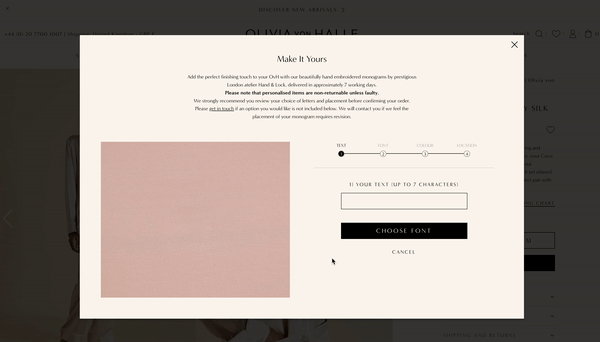
The personalised product builder that we implemented overlays the specified text onto a patch the same shade as the chosen pyjamas to help customers pick the best thread colour. This visual aid helps to increase a shopper’s confidence in their choice, thereby encouraging the conversion from browser to buyer.
Check out our case study to read more about our work with Olivia von Halle, including how we migrated this premium fashion brand from Magento 1 to Shopify Plus.
Veneta Blinds: Made to measure window coverings
Australian ecommerce brand Veneta Blinds enables shoppers to create bespoke blinds, curtains and shutters. Customers can choose between an array of product types, colours, sizes, materials and control types – with billions of variants available.
As Shopify can only support up to 100 variations per product, we partnered with Melbourne-based development company Disco Labs to create a bespoke product builder for Veneta’s made-to-measure range.
This incorporated a custom visualiser, with advanced levels of product customisation available to shoppers.
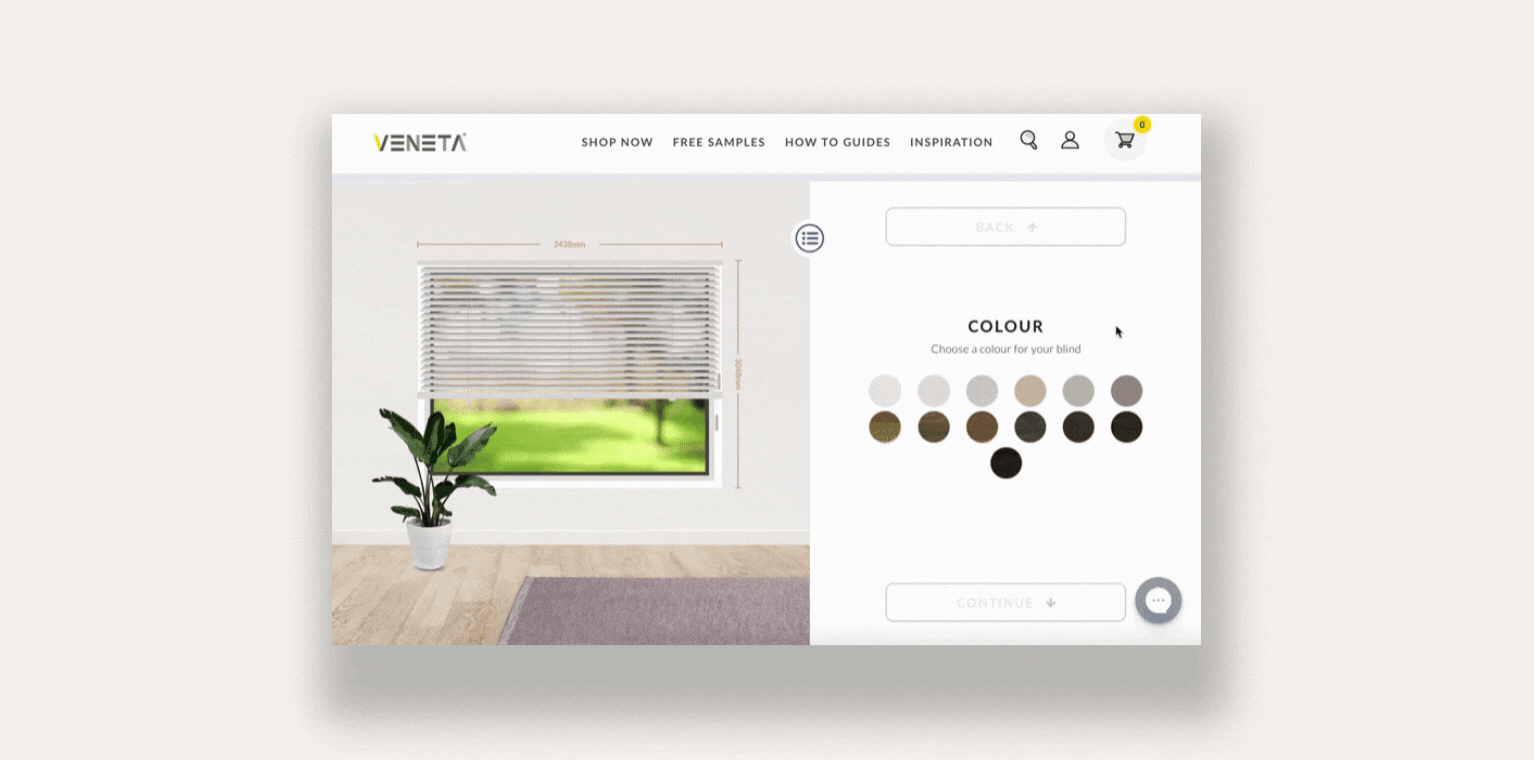
The app also submits an automatic manufacturing request when an order is placed, allowing Veneta’s manufacturer to make and ship all products to order.
Learn more about this solution, as well as some of the other ways we supported Veneta, in our case study about the bespoke product builder.
Sell personalised products on Shopify with Swanky
We hope you are feeling suitably inspired by the benefits that product customisation can deliver, as well as the Shopify examples we’ve shared.
If you have a product that would lend itself perfectly to personalisation and want to find out more about the functionality required for your Shopify store, start a conversation with our team of certified Shopify Plus Experts today.
For reference:
[1] https://www2.deloitte.com/content/dam/Deloitte/ch/Documents/consumer-business/ch-en-consumer-business-made-to-order-consumer-review.pdf
[2] https://www.loopreturns.com/the-ecommerce-returns-benchmark-report/

